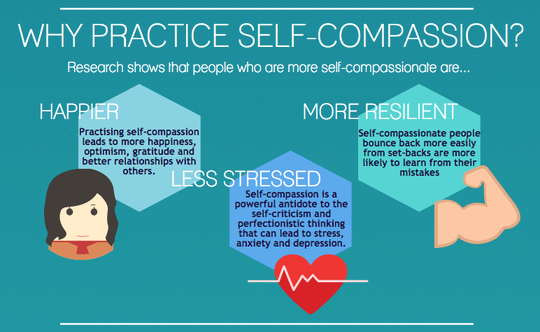Self-Compassion
Joon Choi, Clinical Psychologist
Life is full of experiences – both positive and negative. We can have times of great joy and happiness but also at times pain and despair. Practicing self-compassion is a useful tool to manage the distress that can accompany negative experiences. In fact, research shows that self-compassion can be helpful in managing a wide range of clinical issues, including depression, anxiety and even chronic pain.
What is self-compassion?
Although there is no one universally agreed definition of self-compassion, the core premise involves acknowledging your own suffering and responding in a kind way. In simple terms, this means that you work to try and treat yourself as warmly as you would others around you.
6 steps to self-compassion
Self-compassion can be tricky to master for many people, perhaps because it feels unfamiliar, overwhelming, or even threatening. However, defining the steps we can take to build self-compassion makes the process easier and more streamlined, enabling us to build our self-compassion skills over time.
Step 1 – Acknowledge your experiences
The first step is to really notice and acknowledge our negative experiences (which may include chronic pain). This means we need to pay attention with openness and curiosity, noting all the painful thoughts, feelings and emotions that we might be experiencing. This is often the opposite of what we would normally do, which is to avoid or escape from these thoughts, feelings and emotions.
Step 2 – "Defusion" from self-judgment
We can be very quick to criticise and judge ourselves. It is quite often very easy to focus on our flaws and shortcomings without much hesitation. One key aspect of self-compassion is to learn how to "defuse" or disconnect ourselves from all of the negative self-talk. We do this by noticing, naming and disconnecting from negative thoughts. This involves recognising that these thoughts are just words and pictures in our mind, and that we can allow them to come and go without getting caught up in them.
Step 3 – Acting with kindness
The foundation for self-compassion is kindness. We can conceptualise kindness as the glue that brings together all the elements of self-compassion. So, once we’re able to acknowledge our pain, the aim is to be kind to ourselves. Luckily there are many ways in which we can act kindly – we can use strategies that involve self-talk, imagery, behaviour and actions.
Step 4 – Acceptance
This involves accepting our thoughts, feelings and emotions and allowing them to flow through us without trying to fight or run away. Often when we experience difficulties, we try to escape or “fight” it by engaging in actions that have negative long-term consequences. Examples include use of alcohol or drugs, avoiding or withdrawing from others, or engaging in unhealthy behaviour.
Step 5 – Validation
We often invalidate our own emotions and reactions, struggling to acknowledge our own pain and distress as a normal and natural part of being a person. Our head might tell us that we shouldn’t feel this way, we shouldn’t react that way and that we shouldn’t behave that way. However, this results in an attitude that is harsh, critical and invalidating to our own struggles. A way to validate our experience is through self-talk – that these thoughts and feelings are normal and that we are allowed to feel this way.
Step 6 – Connectedness
Often when we experience difficulties, we tend to have thoughts such as “I am the only one going through this”, “no-one cares”, “everyone else is happy”, or “why me?”. We can also get caught up in these thoughts, which creates a sense of disconnection from others, and so we end up suffering alone. Developing a sense of connectedness with others by defusing from our thoughts, spending time with our close supports and normalising our feelings is a way to improve our ability to cope with our difficulties.
So what’s the take away?
Self-compassion involves all of these elements which we’re able to build block-by-block. Many people have little to no experience in self-compassion and will initially find it challenging. Fortunately, by taking small steps that incorporate these elements, we can all learn to become better at self-compassion in the long-term in order to improve our mental health. Your Advance Healthcare psychologist can also support you in developing self-compassion and bulk billed services are available.
Joon Choi practices from Advance Healthcare St Albans. He completed his Clinical Psychology training in New Zealand and has wide-ranging experience working in health, forensic and community settings across a number of different population groups.




